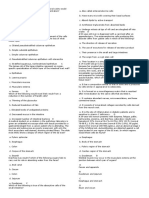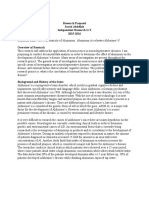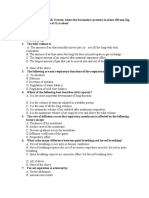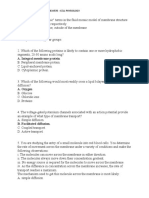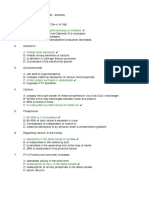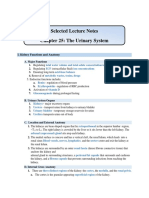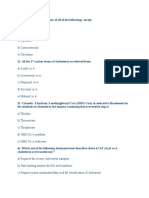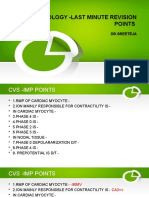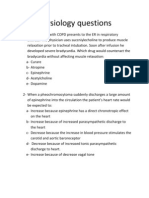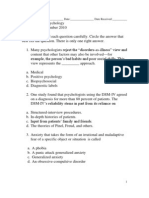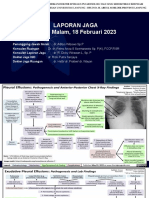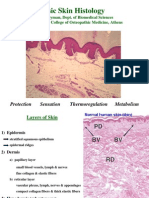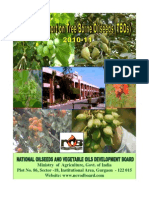0 ratings0% found this document useful (0 votes)
93 viewsBio Chem Important MCQs
Bio Chem Important MCQs
Uploaded by
AbdullahThe document is a 4 page model paper for a biochemistry exam containing 21 multiple choice questions testing knowledge of topics like acid-base balance, enzyme function, metabolic pathways, vitamin deficiencies, and more. It provides the questions, possible answer choices, and identifies the key/correct answer for each question.
Copyright:
© All Rights Reserved
Available Formats
Download as PDF, TXT or read online from Scribd
Bio Chem Important MCQs
Bio Chem Important MCQs
Uploaded by
Abdullah0 ratings0% found this document useful (0 votes)
93 views4 pagesThe document is a 4 page model paper for a biochemistry exam containing 21 multiple choice questions testing knowledge of topics like acid-base balance, enzyme function, metabolic pathways, vitamin deficiencies, and more. It provides the questions, possible answer choices, and identifies the key/correct answer for each question.
Original Description:
Iahshsshshsksksxhsjwg
Copyright
© © All Rights Reserved
Available Formats
PDF, TXT or read online from Scribd
Share this document
Did you find this document useful?
Is this content inappropriate?
The document is a 4 page model paper for a biochemistry exam containing 21 multiple choice questions testing knowledge of topics like acid-base balance, enzyme function, metabolic pathways, vitamin deficiencies, and more. It provides the questions, possible answer choices, and identifies the key/correct answer for each question.
Copyright:
© All Rights Reserved
Available Formats
Download as PDF, TXT or read online from Scribd
Download as pdf or txt
0 ratings0% found this document useful (0 votes)
93 views4 pagesBio Chem Important MCQs
Bio Chem Important MCQs
Uploaded by
AbdullahThe document is a 4 page model paper for a biochemistry exam containing 21 multiple choice questions testing knowledge of topics like acid-base balance, enzyme function, metabolic pathways, vitamin deficiencies, and more. It provides the questions, possible answer choices, and identifies the key/correct answer for each question.
Copyright:
© All Rights Reserved
Available Formats
Download as PDF, TXT or read online from Scribd
Download as pdf or txt
You are on page 1of 4
Page 1 of 4
BDS FIRST PROFESSIONAL EXAMINATION 2007
BIOCHEMISTRY (MCQs)
MODEL PAPER
Time: 30 Minutes. Maximum Marks: 21
01. A Patient has Complaint of Dyspnoea on Exertion which is
not Abated by use of Nebulizers. He fears to go into
Bronchospasm. If the Bronchospasm in this Patient will
Not be Rectified, what is the Likely Result?
a. The Patient will go into Metabolic Acidosis.
b. The Patient will go into Respiratory Alkalosis.
c. The Patient will go into Metabolic Alkalosis.
d. The Patient will go into Respiratory Acidosis.
e. Nothing will happen.
Key: d
02. We have been Observing a Case of Chronic Renal Failure.
The Patient has Registered Complete Anuria for Long.
What is Most Likely Complication Expected in This Case?
a. The Patient is Likely to register Metabolic Alkalosis.
b. The Patient is Likely to register Pulmonary Acidosis.
c. The Patient is Likely to register Metabolic Acidosis.
d. The Patient is Likely to register Pulmonary Alkalosis.
e. The Patient can not go into any Acid Base Abnormality.
Key: c
03. The Most Severe Complication Expected in Uncontrolled
Diabetes Mellitus Patients are which of the Following?
a. Hypoglycaemia.
b. Hyponatremia.
c. Hyperuricaemia.
d. Persistent Hyperglycaemia.
e. Ketoacidosis.
Key: e
04. Amongst the Following Haemoproteins which one is
supposed to Bind More Strongly with Oxygen?
a. Adult Haemoglobin.
b. Haemosidrin.
c. Foetal Haemoglobin.
d. Myosin.
e. Myoglobin.
Key: c
05. A Patient has Elevated Level of Serum Unconjugated
Bilirubin While his Total and Conjugated Bilirubin Levels
are Normal. Which of the Following is Related to this
Clinical Finding?
a. It is a Case of Hepatic Jaundice.
b. It is a Case of Pre Hepatic Jaundice.
c. It is a Case of Post Hepatic Jaundice.
d. It is a Case of Thalassemia Major.
e. It is a Case of Polycythemia.
Key: b
Page 2 of 4
BDS FIRST PROFESSIONAL EXAMINATION 2007
BIOCHEMISTRY (MCQs)
MODEL PAPER
06. Which one of the Following Condition Does NOT lead to
Anaemia?
a. Deficiency of Vitamin C.
b. Deficiency of Copper.
c. Deficiency of Iron.
d. Deficiency of Zinc.
e. Deficiency of Vitamin K.
Key: d
07. In Order to Determine the Sequence of a Polypeptide.
Which is Best Coordination of Techniques?
a. Precipitation → Tryptic Lysis → Polyacrylamide Gel
Electrophoresis → Sanger Reaction.
b. Edman Reaction → X Ray Differection Crystallography → Gel
Electrophoresis.
c. Sanger Reaction → Tryptic Lysis → Polyacrylamide Gel
Electrophoresis.
d. Tryptic Lysis → Polyacrylamide Gel Electrophoresis.
e. Precipitation → Tryptic Lysis → X Ray Differection.
Key: a
08. Most of the Enzymes Secreted in Human Gastrointestinal
Tract are;
a. Oxidoreductases.
b. Lyases.
c. Hydrolases.
d. Transferases.
e. Ligases.
Key: c
09. The Primary Function of Salivary Amylase is designated to
be;
a. Hydrolysis of Dietary Starch.
b. Hydrolysis of Bacterial Cell Walls.
c. Hydrolysis of Dietary Glycogen.
d. Hydrolysis of Mucopolysacchrides.
e. Hydrolysis of Pectins.
Key: b
10. Which one of the Following is NOT a Regular Factor
Effecting Velocity of Enzyme Catalyzed Reactions?
a. pH.
b. Substrate Concentration.
c. Enzyme Concentration.
d. Inhibitor.
e. Temperature.
Key: d
Page 3 of 4
BDS FIRST PROFESSIONAL EXAMINATION 2007
BIOCHEMISTRY (MCQs)
MODEL PAPER
11. A Cardiologist has requested an Array of Tests to Certify
his Diagnosis for a Patient. The Test Battery will have
which of the Following Enzyme Test in Protocol?
a. Alkaline Phosphatase.
b. γ-Glutamyl Transferase.
c. Creatine Phosphokinase.
d. Alanine Amino Transferase.
e. Aspartate Amino Transferase.
Key: c
12. The Gene Operation is Best Described by Lac Operon
which is Authenticated by Which of the Following
Sequence?
a. TATA Box → Pribnow Box → Repressor → Promoter →
Operator → lac Z gene → lacY gene → lac A gene.
b. Operator → Promoter → Repressor → lac Z gene → lacY gene
→ lac A gene.
c. Operator → Promoter → Repressor → lac Z gene.
d. TATA Box → Pribnow Box → Repressor → Promoter →
Operator → lac Z gene.
e. Pribnow Box → Repressor → Promoter → Operator → la Z
gene.
Key: a
13. Which of the Following are Metabolic Functions are
Related to Hexose Monophosphate Shunt Pathway?
a. Ribose-5-Phosphate Synthesis, Fructose-6-Phosphate
Synthesis and Reducing Equivalents for Cholestrogenesis.
b. Biosynthesis of Amino Acids, Formation of Acetyl CoA and ATP
Production.
c. Formation of Lactate and Synthesis of Glyceraldehyde-3-
Phosphate.
d. Formation of Glucuronate, Ascorbic Acid & Oxalates.
e. Biosynthesis of Unsaturated Fatty Acids and Ketone Bodies.
Key: a
14. Final Common Oxidative Pathway which Integrates
Oxidative Products of Fats, Proteins and Carbohydrate is
Also Known as;
a. Ketogenesis.
b. Glucuronic Acid Pathway.
c. Citric Acid Cycle.
d. Gluconeogenesis.
e. Anaerobic Glycolysis.
Key: c
15. In order to Exhibit its Function, Pancreatic Lipase is
Required to Cross React with Triacylglycerols That are;
a. Free.
b. Bound to Mixed Micelles.
c. Attached with Mixed Micelles that are Bound to Colipase.
d. Present as Micelles.
e. Esterified.
Key: c
Page 4 of 4
BDS FIRST PROFESSIONAL EXAMINATION 2007
BIOCHEMISTRY (MCQs)
MODEL PAPER
16. Protein Synthesis is a Designated Function of;
a. Thyroid Hormones.
b. Growth Hormones.
c. Insulin.
d. Cortisol.
e. Catecholamine.
Key: c
17. Largest Amount of Energy is Produced by Which of the
Following Metabolic Sequence.
a. Anaerobic Glycolysis.
b. Aerobic Glycolysis.
c. β-Oxidation of Unsaturated Fatty Acids.
d. β-Oxidation of Saturated Fatty Acids.
e. Oxidation of Amino Acids.
Key: d
18. A Ricketic Patient would Best Respond the Treatment in
One of the Following Way.
a. Therapeutic Doses of Vitamin D Only.
b. Therapeutic Doses of Vitamin D with Dietary Calcium.
c. Therapeutic Doses of calcium Only.
d. Therapeutic Doses of Vitamin C.
e. Therapeutic Doses of Vitamin C & Calcium.
Key: b
19. Which one of the Following Clinical Abnormalities are
Recorded in Dietary Deficiency of B Complex Vitamins?
a. Scurvy.
b. Osteomalacia.
c. Pernicious Anaemia.
d. Haemolytic Anaemia.
e. Xerophthalmia.
Key: c
20. The Major Endocrine Stimulus for Haemopoeisis in the
form of Erythropoietin Comes From;
a. Liver.
b. Pancreas.
c. Kidney.
d. Skin.
e. Hypothalamus.
Key: c
21. The Major Site of Formation of Bilirubin in Human Body is;
a. Liver.
b. Spleen.
c. Intestine.
d. Pancreas.
e. Kidney.
Key: b
You might also like
- The Most Used 10000 Words in EnglishDocument90 pagesThe Most Used 10000 Words in EnglishNəsib İsmayıllı0% (1)
- Human Physiology-McqDocument2 pagesHuman Physiology-Mcqaryan kothambiaNo ratings yet
- GITDocument19 pagesGITPurple Ivy GuarraNo ratings yet
- PATHODocument21 pagesPATHOMitch C.No ratings yet
- DocxDocument22 pagesDocxmuryum100% (1)
- Medical SemiologyDocument8 pagesMedical SemiologyCpopNo ratings yet
- Heal YourselfDocument198 pagesHeal Yourselfkeithmac100% (5)
- Research ProposalDocument3 pagesResearch Proposalapi-321506941100% (4)
- Andrew Hopkins Making Safety WorkDocument223 pagesAndrew Hopkins Making Safety Workkusumawardati100% (1)
- Biochemistry Student PDFDocument21 pagesBiochemistry Student PDFDar AaqibNo ratings yet
- BCH Finals 1Document12 pagesBCH Finals 1roxanne.viriNo ratings yet
- Carbohydrates Biochemistry Seq With KeyDocument4 pagesCarbohydrates Biochemistry Seq With KeyNehaChaudryNo ratings yet
- MCQ On BloodDocument11 pagesMCQ On Bloodgpay98No ratings yet
- 33 MCQs On Renal Physiology USMLE Step 1 ForumDocument23 pages33 MCQs On Renal Physiology USMLE Step 1 ForumAisha YolaNo ratings yet
- DM Questions For IM ResDocument2 pagesDM Questions For IM ResAj BrarNo ratings yet
- DPP 2 Oesophagus and StomachDocument4 pagesDPP 2 Oesophagus and StomachDr-Atin Kumar SrivastavaNo ratings yet
- 2nd MB Resit 2019 Respiration QuestionsDocument5 pages2nd MB Resit 2019 Respiration Questionsada100% (1)
- Breast+endocrine Surg-EMQ-18Document18 pagesBreast+endocrine Surg-EMQ-18assssadfNo ratings yet
- Gastro Physiology QuizDocument3 pagesGastro Physiology QuizKarina Sanchez Mercado100% (2)
- Cell Physiology Revision QuestionsDocument6 pagesCell Physiology Revision QuestionsjoojoNo ratings yet
- Flashcards - GI EmbryologyDocument6 pagesFlashcards - GI EmbryologyKhanNo ratings yet
- Spleen MCQDocument22 pagesSpleen MCQShriyansh Chahar0% (1)
- Paraproteins A Review Article and MCQ'sDocument10 pagesParaproteins A Review Article and MCQ'slataseyaniNo ratings yet
- 2nd Year Bio OspeDocument3 pages2nd Year Bio OspeArvinth Guna Segaran0% (1)
- Physiology 3RD Test Steeplechase Revision 2023Document3 pagesPhysiology 3RD Test Steeplechase Revision 2023NewtonNo ratings yet
- MCQ QuestionsDocument2 pagesMCQ QuestionsShriyans JainNo ratings yet
- Physiology Final Exam - Glory 2017 PDFDocument14 pagesPhysiology Final Exam - Glory 2017 PDFMohammad BarakatNo ratings yet
- MCQ Blok 11Document10 pagesMCQ Blok 11Jefri SoniNo ratings yet
- MCI Screening Test 2005Document46 pagesMCI Screening Test 2005Iboyaima SinghNo ratings yet
- Carbohydrate Metabolism - MCQs 4 BDocument10 pagesCarbohydrate Metabolism - MCQs 4 BSaroja Veeresh100% (1)
- Urine Formation and Routine TestDocument22 pagesUrine Formation and Routine Testabigail lausNo ratings yet
- BIOE 340: Physiology Review Questions: Student Number: Name and SurnameDocument3 pagesBIOE 340: Physiology Review Questions: Student Number: Name and SurnameDilara KüçükkurtNo ratings yet
- Case Studies On Lipids and Cardiac EnzymesDocument11 pagesCase Studies On Lipids and Cardiac EnzymesIdrissa John Sebeh Conteh100% (1)
- Physiology Calcium Metabolism MCQ AnswersDocument2 pagesPhysiology Calcium Metabolism MCQ AnswersFor ChristNo ratings yet
- Selected Lecture Notes Chapter 25: The Urinary System: I. Kidney Functions and AnatomyDocument12 pagesSelected Lecture Notes Chapter 25: The Urinary System: I. Kidney Functions and AnatomyMarilia BonorinoNo ratings yet
- بايو بيبر 1 د.جميلة السمهريDocument8 pagesبايو بيبر 1 د.جميلة السمهريOzgan SüleymanNo ratings yet
- Examination Number .......... NACTE Registration NumberDocument12 pagesExamination Number .......... NACTE Registration NumberNithish DevadigaNo ratings yet
- Year 3 Undergraduate Progressive Test - Attempt reviewPDF - 231031 - 194511Document49 pagesYear 3 Undergraduate Progressive Test - Attempt reviewPDF - 231031 - 194511DR BUYINZA TITUSNo ratings yet
- CVS. Questions and AnswersDocument6 pagesCVS. Questions and AnswersOmar HNo ratings yet
- En-Metabolism LipidicDocument25 pagesEn-Metabolism LipidicCristina THCSNo ratings yet
- Respiratory Module TestDocument14 pagesRespiratory Module TestMuhammad AhmadNo ratings yet
- Nelson MCQ Fluid TherapyDocument10 pagesNelson MCQ Fluid TherapyBelinderjit Kaur100% (2)
- 1 4899983447608524847Document113 pages1 4899983447608524847berlianroma100% (1)
- HSD Sept22 Clin Chem Saqs Essay and Case Studies Exam PapersDocument10 pagesHSD Sept22 Clin Chem Saqs Essay and Case Studies Exam PapersYusuph MipawaNo ratings yet
- MCQs InfectionsDocument6 pagesMCQs InfectionsNaeem NawazNo ratings yet
- 10 MCQ QuizDocument4 pages10 MCQ QuizAnonymous RxWzgONo ratings yet
- Cell MCQDocument12 pagesCell MCQFave EsperanzaNo ratings yet
- Mcq,Quiz هستو الترم الاولDocument74 pagesMcq,Quiz هستو الترم الاولMahmoud AbouelsoudNo ratings yet
- Biochemistry IDocument10 pagesBiochemistry IKathiravan Murugesan (Kathir An)No ratings yet
- Physiology Final Exams JULY 8, 2020Document17 pagesPhysiology Final Exams JULY 8, 2020Ndor BariboloNo ratings yet
- Human Physiology MCQSDocument8 pagesHuman Physiology MCQSHaris Qurashi100% (1)
- Metabolism MCQ ADocument0 pagesMetabolism MCQ ASurajit BhattacharjeeNo ratings yet
- Pathology MCQDocument3 pagesPathology MCQmaria tafaNo ratings yet
- PHYSIOLOGY COMPRE 2nd Yr - 230512 - 233623 1Document6 pagesPHYSIOLOGY COMPRE 2nd Yr - 230512 - 233623 1SANKEPALLI, PAVITHRA REDDYNo ratings yet
- Past Papers For Anatomy GISDocument23 pagesPast Papers For Anatomy GISMohammad DarkhabaniNo ratings yet
- Kidney 1 PDFDocument8 pagesKidney 1 PDFحسين فاضل حسين طالبNo ratings yet
- MCQ TBL Cardiovascular Adaptation To Muscular ExerciseDocument40 pagesMCQ TBL Cardiovascular Adaptation To Muscular ExerciseAdlina Tajuddin100% (1)
- Respiratory HistologyDocument7 pagesRespiratory HistologyLAILYMASRUROHNo ratings yet
- Physiology - Last Minute Revision Points: DR - SreetejaDocument25 pagesPhysiology - Last Minute Revision Points: DR - SreetejaBanu KubendiranNo ratings yet
- Physiology QuestionsDocument14 pagesPhysiology QuestionsLamis Alhaj KaddamNo ratings yet
- Mbbs Pathology QuestionsDocument11 pagesMbbs Pathology QuestionsAli KhanNo ratings yet
- Proteins Covalent Structure - Biochemistry Questions and Answers - SanfoundryDocument1 pageProteins Covalent Structure - Biochemistry Questions and Answers - SanfoundryAli HassanNo ratings yet
- Biochemistry Student PDFDocument28 pagesBiochemistry Student PDFVictoric ValNo ratings yet
- University of Health Sciences LahoreDocument1 pageUniversity of Health Sciences LahoreAbdullahNo ratings yet
- Admit/Entry Card: University of Health Sciences, LahoreDocument1 pageAdmit/Entry Card: University of Health Sciences, LahoreAbdullahNo ratings yet
- Admit/Entry Card: University of Health Sciences, LahoreDocument1 pageAdmit/Entry Card: University of Health Sciences, LahoreAbdullahNo ratings yet
- Admit/Entry Card: University of Health Sciences, LahoreDocument1 pageAdmit/Entry Card: University of Health Sciences, LahoreAbdullahNo ratings yet
- Announcement 2019 MCATDocument1 pageAnnouncement 2019 MCATAbdullahNo ratings yet
- The Story of A Young BoyDocument2 pagesThe Story of A Young BoyAbdullahNo ratings yet
- Code / Security MOB-32262 / 47346 Ticket Code: MOB-32262 Security Code: 47346 Boarding CouponDocument1 pageCode / Security MOB-32262 / 47346 Ticket Code: MOB-32262 Security Code: 47346 Boarding CouponAbdullahNo ratings yet
- Pharmacology PDFDocument167 pagesPharmacology PDFAbdullahNo ratings yet
- Medical Emergenceies in Dental PracticeDocument31 pagesMedical Emergenceies in Dental PracticeAbdullahNo ratings yet
- DGBHGDocument10 pagesDGBHGAbdullahNo ratings yet
- 2022-03-03 St. Mary's County TimesDocument32 pages2022-03-03 St. Mary's County TimesSouthern Maryland OnlineNo ratings yet
- Product and Process ReAssureDocument56 pagesProduct and Process ReAssurelesayNo ratings yet
- Leave Regulation TNEBDocument94 pagesLeave Regulation TNEBRinjumon RinjuNo ratings yet
- Final Exam Introduction To Psychology 2010Document13 pagesFinal Exam Introduction To Psychology 2010bahula2000100% (1)
- Tugas BacaDocument20 pagesTugas BacaWayan FerlyNo ratings yet
- HOPE 2 Learning Activity Sheet 4aDocument8 pagesHOPE 2 Learning Activity Sheet 4aDayrille Althea Liwag Yalung100% (2)
- Santol Fruit BenefitsDocument3 pagesSantol Fruit BenefitsAnonymous Zcabg5d6No ratings yet
- Modern Management of Anal FistulaDocument11 pagesModern Management of Anal FistulaMayerlin CalvacheNo ratings yet
- Definitions - NFPADocument365 pagesDefinitions - NFPAAnand KrishnaNo ratings yet
- Office: of The SecretaryDocument7 pagesOffice: of The SecretarysweetiejokNo ratings yet
- Bleeding in Early PregnancyDocument42 pagesBleeding in Early PregnancyIsraa AlaaNo ratings yet
- Apexogenesis 2Document1 pageApexogenesis 2Shalini BhardwajNo ratings yet
- Hemostatic Effects of Kalachuchi (Plumeria Acuminata) Seed Extract in VitroDocument35 pagesHemostatic Effects of Kalachuchi (Plumeria Acuminata) Seed Extract in VitroKaye Malou DelicanoNo ratings yet
- Liver Blood FlowDocument4 pagesLiver Blood Flowhomam Salim Khalaf100% (1)
- R - MN R - 1 Z: Mkg-Xixltechlib/1 T/06Document48 pagesR - MN R - 1 Z: Mkg-Xixltechlib/1 T/06Jhantu MazumderNo ratings yet
- Powerpoint Presentation FinalDocument17 pagesPowerpoint Presentation Finalapi-402260827No ratings yet
- Differential Diagnosis of Papilledema - UpToDateDocument28 pagesDifferential Diagnosis of Papilledema - UpToDateDaniel PadillaNo ratings yet
- 3M Disposable Respirator 1870+, N95: Technical Data SheetDocument2 pages3M Disposable Respirator 1870+, N95: Technical Data Sheetgeeko geekNo ratings yet
- Investigatory ProjectDocument13 pagesInvestigatory ProjectShine RoselineNo ratings yet
- Basic Skin Histology: Mark Berryman, Dept. of Biomedical Sciences Ohio University College of Osteopathic Medicine, AthensDocument24 pagesBasic Skin Histology: Mark Berryman, Dept. of Biomedical Sciences Ohio University College of Osteopathic Medicine, Athenswazo100No ratings yet
- 6th R&D-ReportDocument112 pages6th R&D-ReportJyoti Satsangi100% (1)
- Breast Lump History OSCE Guide Breast Cancer Geeky MedicsDocument1 pageBreast Lump History OSCE Guide Breast Cancer Geeky MedicsAnne Julia AgustinNo ratings yet
- Ak 17121723Document1 pageAk 17121723raghavremNo ratings yet
- Epidemics and War The Impact of Disease On Major Conflicts in HistoryDocument355 pagesEpidemics and War The Impact of Disease On Major Conflicts in Historyantoine mondou100% (1)
- Grade 5 Term 4 Life Skills Lesson Plan Name of Lesson: Become A Disease Detective!Document3 pagesGrade 5 Term 4 Life Skills Lesson Plan Name of Lesson: Become A Disease Detective!Raeesa SNo ratings yet
- ĐỀ ÔN LUYỆN VÀO 10 SỐ 1Document16 pagesĐỀ ÔN LUYỆN VÀO 10 SỐ 1hadieungocdtntqh93No ratings yet


